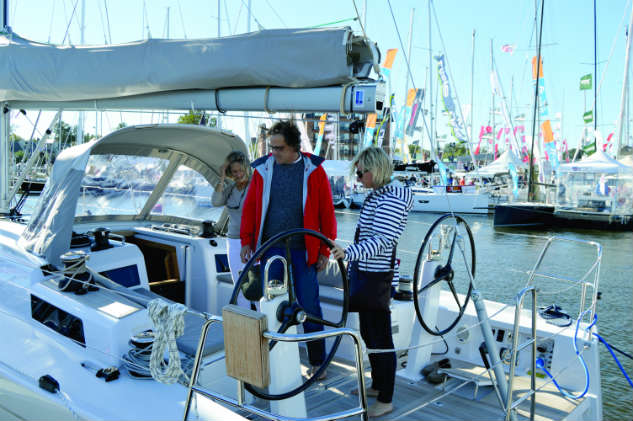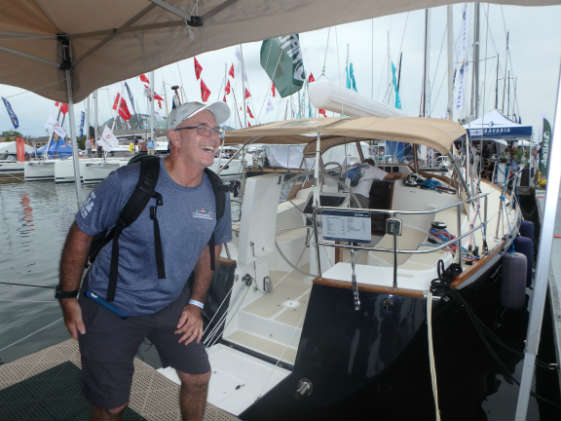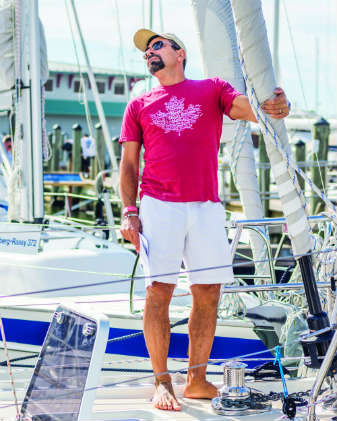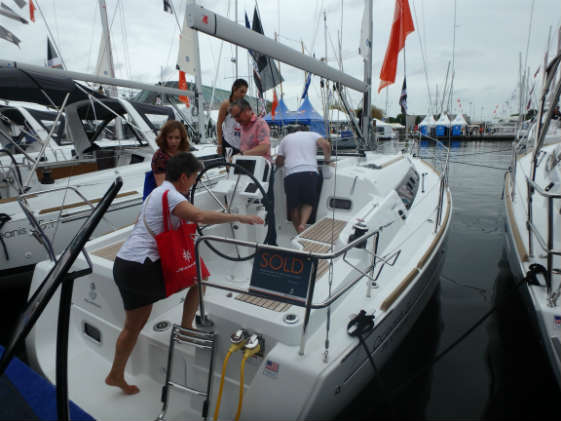While boat shopping, consider this...
If you're getting serious about buying a boat, you will find a dizzying array of them at the Annapolis Sailboat Show. After interviewing marine industry experts for many years, we’ve gathered and condensed their advice into the surefire ANCHOR boat shopping method. Here’s how it works:
A = Assess your sailing goals:
What’s your sailing vision? What’s your experience? What do you hope to achieve on your boat?
Kate Christensen of Rogue Wave/ David Walters Yachts in Annapolis asks potential clients, “Who will be sailing with them—kids or a dog? Who will visit—grandparents? All that stuff matters. Then, we work to find a boat that supports their vision.”
Christensen, who specializes in bluewater-capable sailboats, asks whether clients envision sailing down the Intracoastal to Marathon, FL, or to the Caribbean or Maine, or even to do a circumnavigation. Such goals require unique qualities in boats.
Sailors who plan to remain on the Chesapeake and only sail locally on weekends also have different equipment needs, as well as shallower draft boats that sail well on the Bay. What is your sailing vision? Write it down. Ask yourself if you’re missing anything about the lifestyle you envision onboard.
N = Need advice—yes, you. You need advice.
No matter what your skill level or boat-buying savvy, know that you still need advice. Seek it out from fellow sailors—in particular those who own boats similar to the one you envision—sailing industry specialists, dealers, and yacht brokers. At the U.S. Sailboat Show, there will be thousands of sailing experts on the docks; find them, and ask them questions. They are eager to share their knowledge.
Meet a yacht broker you like. If you’ve ever bought a home, you know how important it is to find a trusted real estate broker to help you navigate the process. Finding a yacht broker is similar. While you are at the boat show, talk to as many brokers as you can. If you find one who listens well and seems to understand what you’re looking for, stay in touch with him or her. You may be able to surf the internet for boats, but yacht brokers spend their days immersed in what’s new and what’s available to you. Pick their brains. Let them guide you. (Find qualified brokers here).
C= Compute your budget
Sorry to have to bring reality into the equation, but you can’t buy a boat without facing the numbers.
“Most likely, the purchase will require taking out a boat loan,” says Merf Moershel (in his “So You Want To Buy a Boat” SpinSheet series). “There are advantages to financing your boat; the interest on a boat loan could be tax deductible because the boat would qualify as a ‘second home.’” Ask your tax accountant.
“It is best to be pre-approved for your max loan amount as you enter the final phases of your boat buying experience,” says Moerschel. “Making the rounds to banks, boat finance companies, and credit unions will identify the best deal.” At the Sailboat Show, “you will see all the competing loan sources. Each seem to have similar packages and each represents varying degrees of service, so shop, shop, shop.”
As part of your boat budget, you must include: purchase price, marine survey (see “H”), insurance, annual maintenance, slip fees, fuel, winter hauling and storage, and a cruising kitty (piggybank) or racing campaign fund.
H = Hire a surveyor
A qualified marine surveyor works for you and is your insurance against buying the wrong boat or one that is not in good shape. Moerschel says, “A marine survey will establish condition, replacement cost, and insurability as best can be determined and prepare a survey report. Surveying is not an exact science in the sense that not all defects or problems will be uncovered.”
A quality broker can give you a list of competent marine surveyors. Verify their credentials through the National Association of Marine Surveyors (NAMS) and Society of Accredited Marine Surveyors (SAMS), the two certifying societies.
“You want a professional, not a hobbiest,” says Moerschel.
O = Oh, $*&!!
Yes, that expression is part of the process. It could be because you spent money to survey a boat that’s in sub-par shape and decided not to buy her. It could also be because the surveyor came back with positive feedback, and now you’re buying a boat… oh, $*&!!
Take a deep breath. This is supposed to be fun. It’s a big investment, though, so it can be stressful. That’s why you’ve armed yourself with a rock-solid professional team of yacht broker, financial pro, and surveyor. Let them give you guidance. They do this all day long.
R = Run or ride?
Now that you’ve done your homework by assessing your goals, following all sorts of expert advice (and ignoring some of it), assembling your dream marine team, and done your marine survey, you’re in one of two places: run for the hills, or enjoy the ride!
We sure hope it’s the latter, as those first boat rides, from your sea trial to delivery to that long-awaited day you take out your new boat for a sail, are the heart-pounding thrills that make sailing worthwhile. Enjoy the ride!








